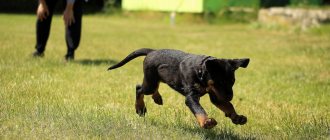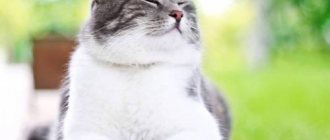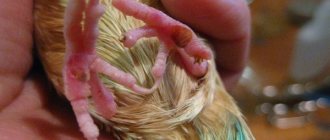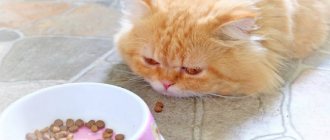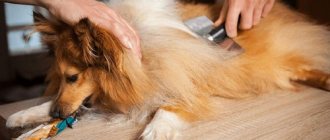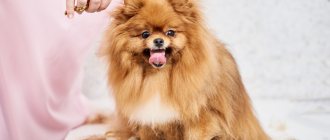Photo by Alvan Nee on Unsplash
The Spitz is a decorative breed that, due to the special anatomy of the nasopharynx, is prone to tracheal collapse and reverse sneezing. Grunting is a common occurrence for a pet, but a preventive examination at a veterinary clinic should be performed twice a year. Only a veterinarian can determine why a Spitz grunts loudly, because the causes of such sounds can be pulmonary, vascular, oncological diseases, or mechanical injuries.
Like I was choking
Often the dog coughs as if he was choking on something after a long walk or meal. The Spitz seems to be trying to cough up a foreign object from its throat. It is worth making sure that the dog has not really choked on a foreign object or piece of food - look into the mouth.
When breathing is compressed by a foreign object, the dog runs, fusses, and begins to salivate. Vomiting may begin. If this factor is excluded, you need to look for other reasons.
It is worth noting here that small breed dogs tend to have a constant cough when they are nervous. This is due to the fact that the cartilages of the Spitz's larynx have an open ring shape and cause spasm. This can happen while eating or actively moving.
It is necessary to calm the pet, pet it, pick it up or give it water to drink.
Stroking the throat from top to bottom using gentle, smooth movements will also help. Important! A smoking owner should prevent their pet from inhaling tobacco smoke.
Prevention measures
If, for example, a Spitz grunts and wheezes, as if it is suffocating, in order to avoid unpleasant symptoms you should:
- provide your pet with a balanced and varied diet;
- organize a room for keeping the dog so that it is warm, protected from winds and cold;
- do annual preventive deworming;
- double-check the sanitary and hygienic standards for keeping the animal.
A balanced diet is essential to maintaining your pet's health.
Wheezes or sneezes
Wheezing, sneezing, or “humming” sounds when coughing may indicate an infectious disease in your Spitz.
A common diagnosis is “ kennel cough .” It occurs in pets with weak immunity when in contact with other dogs, for example, in a kennel or at a show. The diagnosis is made by a veterinarian and treatment is prescribed. Bronchitis, including chronic bronchitis, can also be diagnosed in a Spitz.
You should also be wary of tracheal collapse , a chronic disease that often occurs in small breeds. The cause of its occurrence is a genetic deformation of the tracheal rings, during which the trachea becomes denser and modified. As a result, the lower and upper parts of the trachea come into contact.
This disease cannot be ignored - it can lead to the death of your pet. The diagnosis is made by a veterinarian using hardware diagnostics.
Neoplasms of various origins
Tumors in the nasopharynx are diagnosed more often in dogs after 7-8 years of age and cause a specific sound reminiscent of grunting. The first signs appear suddenly in the form of shortness of breath or difficulty swallowing. The faster the tumor grows, the stronger the symptoms; it becomes difficult for the pet to eat and breathe, especially during physical exertion; he tries to “cough up” and remove the interfering tumor.
Carcinomas are found in the larynx, polyps and sarcomas are found in the nose. Favorable prognosis for polyps. If they are detected in a timely manner, surgery is performed and removed. With sarcomas and carcinomas, everything depends on the stage of the pathological process and the degree of tumor penetration into healthy tissue. In case of metastasis to other organs, surgical treatment is not justified.
Constant, at night and not only
A constant cough with intensification and severe snoring and snoring at night is a consequence of brachycephalic syndrome , characteristic of dogs with a shortened skull, such as the Spitz.
This is the so-called “soft palate” condition . The soft palate in the back wall is so long that it reaches the respiratory tract, resulting in snoring and coughing. A Spitz may begin to snore and have a specific cough from 3-4 months, and it may get worse in warm, humid weather.
Reverse sneezing
This sign is more common in dogs of dwarf breeds with a long, narrow muzzle (toy poodle). Outwardly, it looks as if the pet has got something in its nose and is frantically trying to sneeze it out. At the same time, he draws in air and makes grunting sounds, coupled with shortness of breath and noisy breathing.
More often than not, this is not a dangerous symptom. It is necessary to do an ECHO, X-ray and exclude tracheal collapse and heart failure. The attack is short-lived, a maximum of 10 minutes; if you massage the back of the nose, it stops, the dog calms down and stops grunting.
The reasons for this phenomenon have not been studied; there is an assumption that this is due to a certain type of structure of the larynx, as well as dust and pollen entering the nasopharynx. There is no treatment.
Severe attacks
If your pet has a persistent, severe cough, you need to rule out an allergic cough or a cough due to cardiovascular disease . So, with heart disease, pressure can occur on the bronchi, which causes coughing attacks. This can happen to a dog after six years of age.
You can also notice tachycardia, cyanosis of the mucous membrane, and lethargy . It is necessary to visit a veterinarian who will perform a chest x-ray and listen to the dog's heart.
WHAT IS NIGHT COUGH DANGEROUS?
Coughing attacks that occur at night can cause many temporary and even permanent health problems. To understand how harmful this condition is to the body, we can cite only one of the complications. Do you like memory impairment, decreased visual acuity, and impaired sense of smell? It would seem that what does a night cough have in common with the loss of such important functions as the ability to clearly see the world around us, remember information and smell? The relationship is more obvious than it seems at first glance: oxygen starvation and lack of rest in the main organ of the human body - the brain. In the dark, the brain must rest and restore resources used during the day. These processes are possible only during deep sleep, into which the body is simply unable to immerse itself - it is constantly awakened by coughing. You will survive several such nights without consequences, but a prolonged dry or wet night cough will sooner or later lead to chronic fatigue of the brain with subsequent dysfunction of its various areas. What to do if a night cough interferes with normal life?
How to treat dogs of this breed?
As we mentioned earlier, if the cough is caused by nervous excitement, the Spitz should be calmed and given water. But if it is caused by other factors, treatment should be carried out.
- Infectious disease, “kennel cough”, bronchitis – general recommendations include taking an expectorant mixture, vitamins, warm milk with honey, and, if necessary, antibiotics to avoid complications such as pneumonia.
- Collapse of the trachea - the doctor may recommend, if necessary, reducing the dog’s weight, purchasing a special harness-collar, taking medications and drugs that increase immunity. In severe cases, an implant must be installed.
- Allergic cough - the allergen must be eliminated.
- In case of “heart” syndrome , it is worth ensuring the dog’s peace and not subjecting it to excessive stress. A mixture of honey and lemon juice will help reduce a coughing attack: mix 1 tbsp in 200 ml of warm water. a spoonful of honey and half a tablespoon of lemon juice, give the mixture to the Spitz once a day. The veterinarian may also prescribe medications to relieve the severity of the symptom.
- Brachycephalic syndrome - treatment is prescribed by a veterinarian; in severe cases, surgery is performed.
A general diagnosis of the causes of cough in Spitz dogs consists of measuring the temperature, externally examining the dog’s mouth for ulcers and hemorrhages, palpating the trachea, abdominal cavity, and checking the lymph nodes.
When to contact a veterinarian
Your Pomeranian should be taken to a veterinarian if he is choking when he grunts. Perhaps nothing serious, but it’s worth checking so as not to miss complications.
You should also contact your veterinarian if your dog has:
- physical condition noticeably deteriorated, lethargy appeared;
- no appetite, weight loss rapidly;
- the mucous membranes turned pale and blue;
- difficulty breathing;
- an intense cough has appeared, which is getting worse;
- body temperature increased;
- a runny nose appeared, the nose was stuffy;
- excess weight;
- an allergic reaction occurred.
Uncharacteristic sounds made by a Spitz in combination with the listed symptoms signal serious pathologies, so contacting a veterinarian should not be delayed.
Causes in puppies
At a young age, Spitz are most susceptible to “kennel cough . As a rule, it appears on the 2-3rd day, when the puppy is brought into the house, that is, after the incubation period has passed.
The prognosis for treatment of this disease is favorable, but it is worth visiting a veterinarian. He will prescribe special treatment with expectorants that are acceptable for the puppy.
Attention! It is important to vaccinate the animal on time and take a course of anthelmintic drugs. But vaccination can only be done during a period when the animal is healthy.
Growl
Such sounds do not always indicate anger or aggression. The animal may growl out of fear. Dogs can growl to react to actions that are unpleasant or painful for them (pricks, claw trimming). With similar sounds they can react to the unknown (strangers entering the house) or protect their resources (toys, food).
The dog will also howl to warn of danger, for example, if it hears the siren of a fire truck.
Do Pomeranians get sick often?
Every potential owner of a dwarf Spitz is interested in what health problems the dog may have at a young age and as it grows. The Pomeranian is distinguished by good health, since the breed was created artificially and breeders did painstaking work to obtain individuals with strong immunity. Spitz are distinguished by a long life expectancy - 12-14 years, some individuals become old-timers, living 15-17 years.
Most diseases of toy dogs are associated with their miniature size. You should carefully monitor your small pet in order to promptly notice deviations in behavior, which are the first signs of pathologies. For their prevention and prevention, deworming, vaccination, regular visits to the veterinarian, careful care and proper maintenance of Pomeranian Spitz play an important role.
Parasite infestation
There is a common belief that parasitic worms exclusively affect the gastrointestinal tract, but this is far from the truth. Although the intestines are indeed a favorite place for worms, there are several types of worms that prefer to live in the lungs.
As the colony of worms increases, the breathing of the dog, especially the puppy, will worsen, since the circulation of air masses is inadequate. Again, the danger lies not in grunting or hissing, but in the fact that there have been cases where puppies died, literally suffocating. With progressive helminthic infestation, there is a risk that all offspring will die!
In addition, there are certain types of parasites from the group of nematodes, which spend one of their life cycles in the lungs. In this organ, young individuals receive adequate nutrition for intensive growth and remain here until they grow up. Then they move to the intestines, where their “adult life” begins, followed by reproduction.
While the parasite larvae are in the tissues of the lungs, they injure the organ - the alveoli and bronchi. In addition, after a week and a half, nematodes begin to synthesize specific substances that irritate the mucous surfaces of the respiratory system. This leads to the development of intense coughing and sneezing, and in young animals these signs manifest themselves more actively.
When the dog breathes, gurgling, wheezing sounds are heard, he begins to grunt, sniffle, trying to push air into the lungs with irritated and inflamed walls. If the helminthic infestation has developed to such a clinical picture, a doctor’s consultation is required, since if there is any delay, the dog will develop pneumonia or severe bronchial inflammation.
What to do if your Pomeranian is crying?
Pomeranians have a peculiarity - their eyes run very often. Tear tracks appear, which are especially noticeable on light-colored fur. Before seeking help from a veterinarian, it is worth observing and finding out the cause of the lacrimation. It could be:
- long hair around the eyes;
- flaws in nutrition;
- unfavorable weather conditions (wind, heat);
- dust, pollen;
- allergic reaction;
- injury;
- diseases.
If the dog is healthy, its eyes are clear, clean and shiny. When there is no pus, but only occasional tears are released, this is normal. Perhaps fur or eyelashes are getting into the eye and irritating it. If the volume of discharge increases, it is necessary to take measures - cut off the hair near the eyes using safety scissors, wipe daily with a cotton pad soaked in boiled water.
When swelling of the eyelids occurs, use Chamomile eye lotion with an antimicrobial effect.
When watery eyes are caused by the wind, special eye drops that are instilled immediately before a walk will help.
Eyes often water because of the presence of sweets in the Pomeranian's diet. By analyzing the menu and excluding prohibited foods (sweet, fatty, fried), you can achieve the desired result.
If the dog continues to cry, you should consult a doctor, since the cause may be more serious - inversion of the eyelids, inflammation of the lacrimal sac. In this case, serious treatment of the disease and possibly surgery will be required.

